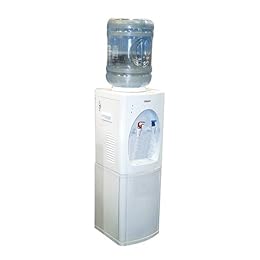Drinking Water
Store drinking water for circumstances in which the water supply may be polluted or disrupted.
If water comes directly from a good, pretreated source, then no additional purification is needed; otherwise, pretreat water before use. Store water in sturdy, leak-proof, breakage-resistant containers. Consider using plastic bottles commonly used for juices and soft drinks.
Keep water containers away from heat sources and direct sunlight.
I plan on blogging more about food storage and related subjects in the future, particularly as this is something that I am working on, myself. As much as we think about food storage, most of us probably don't think much about water.
We need to.
We can live a lot longer with no food than we can with no water.
A good long-term supply of water is going to be VERY HEAVY (at 8 pounds/gallon, plus the weight of storage containers), in addition to taking up A LOT of space...we may not be able to store months and months of drinking water (not to mention enough water to use for hygiene and washing clothes, dishes, and the like--the gray water left over from washing dishes and clothes can be "recycled" and used to flush the toilet in a situation where we need to conserve water to that extent).
We may not be able to do anything like this: http://www.zombiehunters.org/forum/viewtopic.php?f=6&t=24111, but what can we do?
A few things that are worth consideration:
- Water filtration. If we can't store 700 gallons of water (FEMA recommends one gallon of water per person, per day for drinking, cooking, and hygiene, on average), and let's face it, that's a LOT--over 2 1/2 TONS of water--then we need to find a way to come up with more water. A good filtration system may be the way to go. http://www.providentliving.org/content/display/0,11666,8207-1-4531-1,00.html http://www.aquasana.com/?&discountcode=asUS
- We may need to look for other sources of water. While it would be great to have a reliable source of well water, that may not be available. Rain barrel? You'll definitely need to purify that--how often do you clean your gutters? How often does it rain in your area, and how much? I'm not trying to say I have all the answers, but maybe someone will think of something that I missed.
- Foods with a lot of water may help reduce our daily water use in an emergency situation. Canned fruits can help. The water in canned vegetables can replace some of the water required in recipes. If you need water, don't dump the water from the can down the sink! Use it!
For most of us, at least in the short-term, smaller water storage containers may be our best bet. Stay away from milk jugs and other similar containers, as the thin plastic is not terribly durable, the cap can pop off fairly easily, and the plastic is not going to last long-term. Something like this:
 http://www.target.com/Haier-Water-Dispenser-WDNSC145/dp/B000BQWAAG/sr=1-15/qid=1233981354/ref=sr_1_15/191-3233813-4535222?ie=UTF8&pricerange=&rank=price&rh=k%3Ahome%20water%20coolers&page=4 might be a good way to go. The jugs hold a good amount of water, and are easier to acquire, move, and utilize than 55 gallon drums.
http://www.target.com/Haier-Water-Dispenser-WDNSC145/dp/B000BQWAAG/sr=1-15/qid=1233981354/ref=sr_1_15/191-3233813-4535222?ie=UTF8&pricerange=&rank=price&rh=k%3Ahome%20water%20coolers&page=4 might be a good way to go. The jugs hold a good amount of water, and are easier to acquire, move, and utilize than 55 gallon drums.
http://www.usplastic.com/catalog/product.asp?catalog%5Fname=USPlastic&category%5Fname=11943&product%5Fid=11950 This might work, too.
In addition to the grade of plastic used, keep in mind the amount of space this will take up. Are we using containers that can be stacked, or otherwise minimizing wasted space?
Be sure to keep in mind things such as storage temperature--you don't want your jugs freezing and bursting.
Prolonged exposure to the UV rays in sunlight can weaken plastic and make your storage worthless.
If anybody has any other ideas, please comment.
If you can find room for some larger containers, this site may be of some use to you: http://www.arizonabarrels.com/index.html






This is fantastic!
ReplyDelete